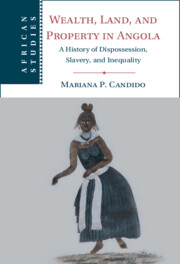Book contents
- Wealth, Land, and Property in Angola
- African Studies Series
- Wealth, Land, and Property in Angola
- Copyright page
- Contents
- Maps and Plans
- Illustrations
- Tables and Graphs
- Acknowledgments
- A Note on Currency and Price-Level Adjustments
- Introduction
- 1 Who Owned What?
- 2 Property Rights in the Nineteenth Century
- 3 Written Records and Gendered Strategies to Secure Property
- 4 Commodification of Human Beings
- 5 Branded in Freedom
- 6 The Erasure of Communal Rights
- 7 Global Consumers: West Central Africans and the Accumulation of Things
- Conclusion
- Bibliography
- Index
- African Studies Series
5 - Branded in Freedom
The Persistent Commodification of People
Published online by Cambridge University Press: 22 September 2022
- Wealth, Land, and Property in Angola
- African Studies Series
- Wealth, Land, and Property in Angola
- Copyright page
- Contents
- Maps and Plans
- Illustrations
- Tables and Graphs
- Acknowledgments
- A Note on Currency and Price-Level Adjustments
- Introduction
- 1 Who Owned What?
- 2 Property Rights in the Nineteenth Century
- 3 Written Records and Gendered Strategies to Secure Property
- 4 Commodification of Human Beings
- 5 Branded in Freedom
- 6 The Erasure of Communal Rights
- 7 Global Consumers: West Central Africans and the Accumulation of Things
- Conclusion
- Bibliography
- Index
- African Studies Series
Summary
As long as people could be used as economic pawns, freedom was an ambiguous status. While legal recognition of property rights over land and goods expanded in the nineteenth century, the morality regarding ownership of human beings was challenged in courts, parliaments, and newspapers for centuries. Chapter 5 explores the experiences of freed people in a context of change related to property recognition and rights along with freed people’s access to property in the second half of the nineteenth century. Although semantics suggest otherwise, there was very little distinction between the experiences of enslaved or freed people in Angola. Accumulation of free and enslaved bodied, known as wealth in people, has been a fundamental framework for understanding West Central African societies’ understandings about wealth and accumulation. But ownership rights over people were contested within a context of juridical changes in all kinds of property rights in Angola. Coerced, unfree labor persisted, even as Portugal introduced gradual means to emancipate slaves in its possessions. Any efforts to regulate and end ownership rights over individuals had a public and a private sphere of debates, where slavers resisted the end of commodification while enslaved individuals rejected amelioration and gradual abolition projects.
- Type
- Chapter
- Information
- Wealth, Land, and Property in AngolaA History of Dispossession, Slavery, and Inequality, pp. 168 - 197Publisher: Cambridge University PressPrint publication year: 2022

